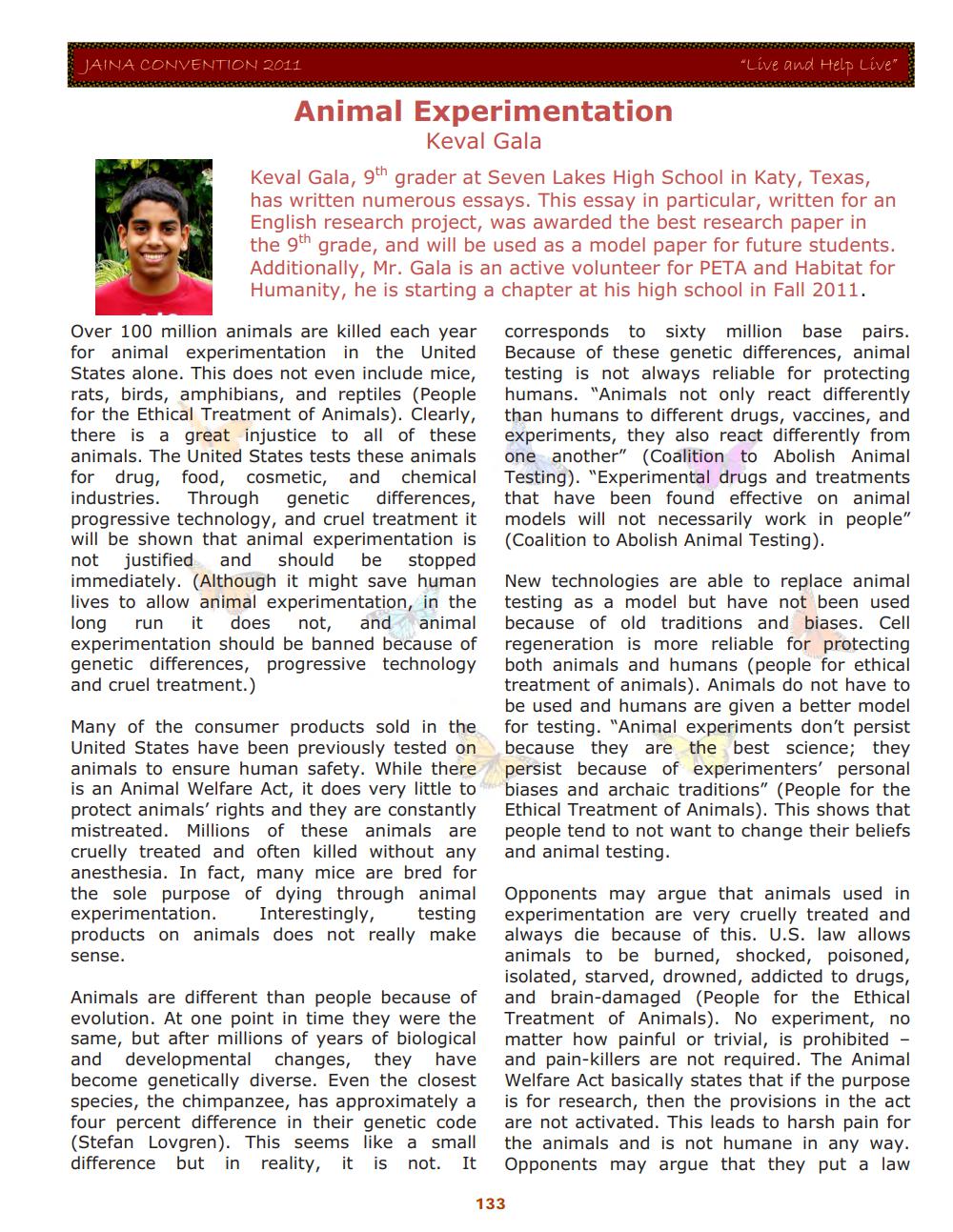________________
JAINA CONVENTION 2011
"Live and Help Live"
Animal Experimentation
Keval Gala Keval Gala, 9th grader at Seven Lakes High School in Katy, Texas, has written numerous essays. This essay in particular, written for an English research project, was awarded the best research paper in the 9th grade, and will be used as a model paper for future students. Additionally, Mr. Gala is an active volunteer for PETA and Habitat for Humanity, he is starting a chapter at his high school in Fall 2011.
Over 100 million animals are killed each year for animal experimentation in the United States alone. This does not even include mice, rats, birds, amphibians, and reptiles (People for the Ethical Treatment of Animals). Clearly, there is a great injustice to all of these animals. The United States tests these animals for drug, food, cosmetic, and chemical industries. Through genetic differences, progressive technology, and cruel treatment it will be shown that animal experimentation is not justified and should be stopped immediately. Although it might save human lives to allow animal experimentation, in the long run it does not, and animal experimentation should be banned because of genetic differences, progressive technology and cruel treatment.)
corresponds to sixty million base pairs. Because of these genetic differences, animal testing is not always reliable for protecting humans. "Animals not only react differently than humans to different drugs, vaccines, and experiments, they also react differently from one another" (Coalition to Abolish Animal Testing). "Experimental drugs and treatments that have been found effective on animal models will not necessarily work in people" (Coalition to Abolish Animal Testing).
New technologies are able to replace animal testing as a model but have not been used because of old traditions and biases. Cell regeneration is more reliable for protecting both animals and humans (people for ethical treatment of animals). Animals do not have to be used and humans are given a better model for testing. "Animal experiments don't persist because they are the best science; they persist because of experimenters' personal biases and archaic traditions" (People for the Ethical Treatment of Animals). This shows that people tend to not want to change their beliefs and animal testing.
Many of the consumer products sold in the United States have been previously tested on animals to ensure human safety. While there is an Animal Welfare Act, it does very little to protect animals' rights and they are constantly mistreated. Millions of these animals are cruelly treated and often killed without any anesthesia. In fact, many mice are bred for the sole purpose of dying through animal experimentation. Interestingly, testing products on animals does not really make sense.
Animals are different than people because of evolution. At one point in time they were the same, but after millions of years of biological and developmental changes, they have become genetically diverse. Even the closest species, the chimpanzee, has approximately a four percent difference in their genetic code (Stefan Lovgren). This seems like a small difference but in reality, it is not. It
Opponents may argue that animals used in experimentation are very cruelly treated and always die because of this. U.S. law allows animals to be burned, shocked, poisoned, isolated, starved, drowned, addicted to drugs, and brain-damaged (People for the Ethical Treatment of Animals). No experiment, no matter how painful or trivial, is prohibited - and pain-killers are not required. The Animal Welfare Act basically states that if the purpose is for research, then the provisions in the act are not activated. This leads to harsh pain for the animals and is not humane in any way. Opponents may argue that they put a law
133




